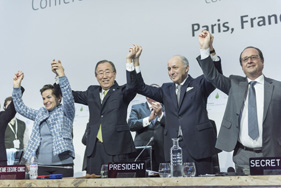Tourism and Paris climate agreement – too little, too late?

An unbelievable achievement, but how is global travel and tourism affected?
First, it has to be said that after the problems of the Kyoto Agreement and the downright depression following the Copenhagen climate talks – Paris looks like an extraordinary achievement. Just the fact of 196 of the world’s nations agreeing that we all need to do something about climate change is a massive step forward.
But after the euphoria, we need to know just what this represents for the global travel and tourism industry.
And if the agreement is too little and too late – in which case all bets are off anyway.
The UN couldn’t make it more clear as to what it expects and without any doubt a spotlight is shining on the industry.
First, in September sustainable tourism was mentioned in no less than three of the 17 UN Sustainable Development Goals.
Second, the UN has scheduled 2017 as the ‘Year of Sustainable Tourism’.
Make no mistake -the Paris Agreement predicates a REDUCTION of emissions by a massive 60% by 2050 and by a substantial 40% by 2030 (from 2010 levels).
Tourism will simply not get a free pass to expand at its present rate, forecast to nearly double by 2030 and to nearly quintuple by 2050. Yes, that’s right – in 35 years international tourism is scheduled to increase from 1billion a year to nearly 5 billion a year – and that doesn’t include domestic and drive-in tourists (usually 5 times more).
There is very little dispute about the basic figures or the reasons for them. The industry expects billions more people (in particularly from Asia/Pacific countries) to achieve middle class status by 2030 and onwards. These people will require the trappings of the middle class – and in particular an annual international holiday.
At the moment the tourism industry provides some 5% of the world’s global emissions of which airlines represent around 50%.
It’s not difficult to do the figures, if tourism doesn’t expand at all – its emissions would have to be cut by more than half by 2050. If it expands as scheduled – its per-passenger emissions would have to be cut by well over 90%. Let’s say that tourism will simply have to be carbon-neutral by 2050 – if it expands.
And there are no get out clauses – like ‘tourism adds to development’.
The fact is that tourism will not only have to become carbon-neutral but it will ALSO have to add to sustainable development.
That is IF the Paris Agreement has any teeth – like a strong system for Monitoring, Reporting and Verification and IF the targets are improved enabling the world to get below the 2 degree threshold (there is a concensus that 100% performance will get 2.7 degrees at the moment).
If that doesn’t happen, all bets are off and we don’t have a world that supports all its population much less a viable tourism industry.
Maybe the Paris Agreement has just opened the door to the world’s biggest battle ever. It’s probably appropriate that the latest Star Wars epic will open as the Paris COP conference closes.
Tourism and Climate Change guru, Professor Stefan Gossling told Vision on Sustainable Tourism: "The international community has set a very ambitious goal to reduce global emissions."
"If this goal is taken seriously, it will mean that all sectors will have to decarbonise, including tourism. Aviation in particular will have to show that it wants to be part of global mitigation efforts. As change needs to be measurable, tourism needs to immediately start monitoring its greenhouse gas emissions on an annual basis to confirm it is on track to meet international agreements."
Download the full agreement HERE
Valere Tjolle
Follow it all also at http://www.SustainableTourism2015.com
 United Kingdom
United Kingdom United States
United States Asia Pacific
Asia Pacific












































BA suspending all Heathrow to Abu Dhabi flights
Unexpected wave rocks cruise ship
Report: Cruise guest died after ship lashed in heavy storm
British teen in serious condition after paraglider collision
JetBlue scraps London Gatwick flights